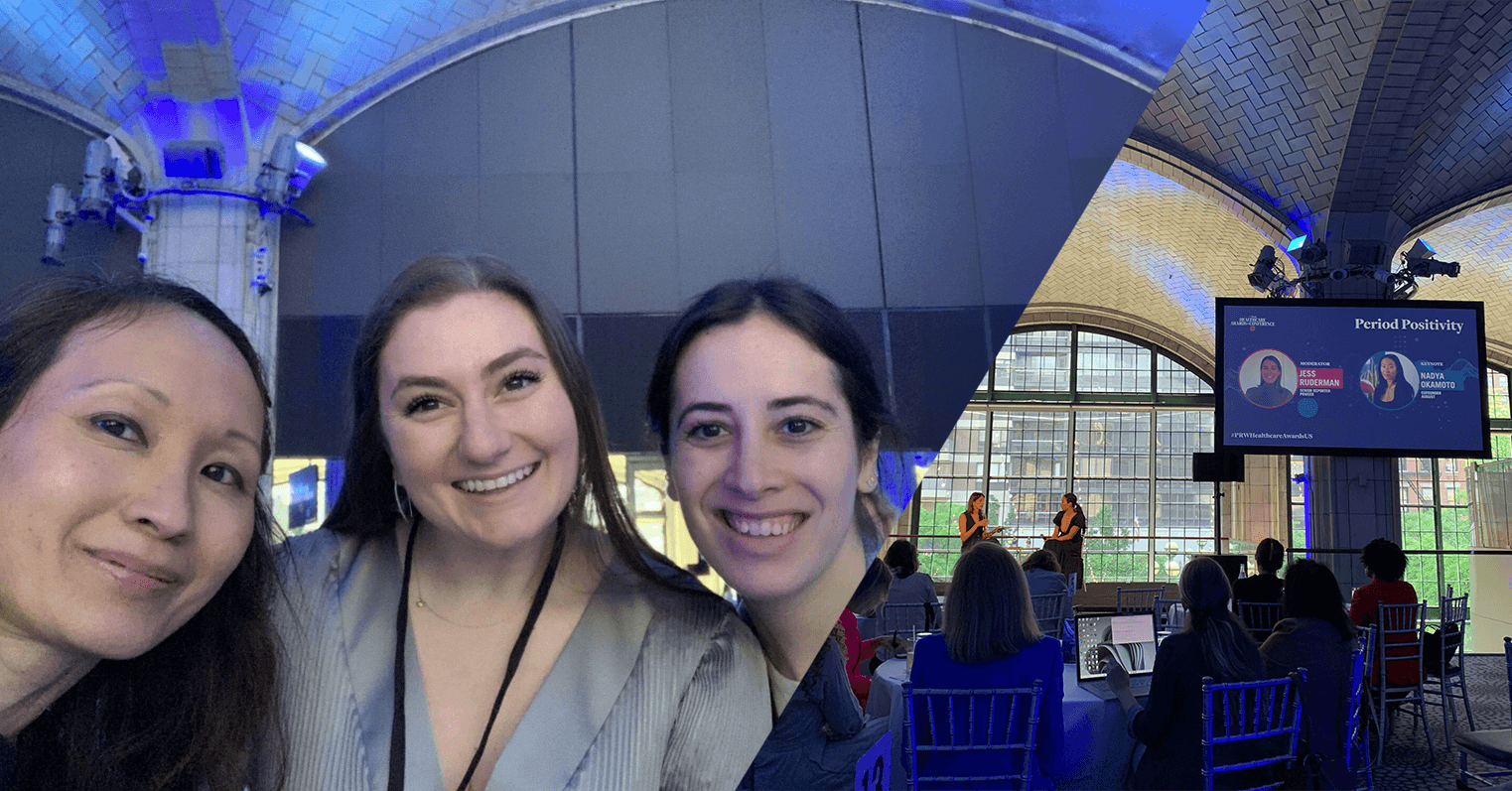
True or false: In some states, period products are taxed as luxury items, but tickets to professional sporting events are not.
It’s been a while since my last blog post on the impact of women’s health on communications. Even as we continue to see steps in health equity that inch toward closing the gender gap, at a recent industry event, I was reminded of how much more work remains.
At the third annual PRWeek Healthcare Conference and Awards on May 21 in New York City, we dove into a rich agenda that explored a variety of topics, from how to dissect and approach the difference between disinformation and misinformation with the rise of social media to a behind-the-scenes look into a recording of the PRWeek Podcast, with guest star and social media influencer Dr. Mikhail “Mike” Varshavski. Women’s health featured prominently throughout the day, which was bookended with two, seemingly very personal, topics that may have elicited discomfort at first blush: Period Positivity and The Menopause Conundrum.
Social entrepreneur and influencer Nadya Okamoto came out in patent red heels and dove right into the question of “Why are periods so stigmatized?” For as long as we can remember, periods have been something women are meant to keep hidden because they’re “embarrassing” or “gross.” She shared personal anecdotes demonstrating that exact stigmatization that I imagine many women can relate to, like hiding a tampon in your sleeve when heading to the restroom, finding yourself without 75₵ in a public restroom in a time of need, or seeing leading period product commercials using blue liquid instead of red.
Unapologetic in the way she talked, Okamoto, who is also the co-founder of August, a lifestyle period brand working to reimagine period care for all, addressed the tampon tax, which she eloquently illustrated with the shocking “true or false” question at the opening of this blog post. This increasingly popular term is used to identify the fact that in states that don’t tax medical and health supplies, period products like tampons, pads, and menstrual cups are excluded from tax-exemption. It also ladders up to a larger phenomenon known as the “pink tax,” a colloquial term coined for gender-biased product pricing. It’s another piece of menstrual stigmatization that she’s trying to fight, offering reimbursement for any tampon tax paid in the 21 states that tax period products as “non-essential goods.”
Okamoto tied her story back to how stigmatization in women’s health impacts her views on communications and PR. She recognizes that PR can serve an important role in establishing a brand’s halo effect, hence her interest in taking live speaking opportunities that place her and her messaging close to the brand’s name. Her honest and raw dialogue translates to much of the messaging you’ll see on the August website.
Bold communications strategies like August’s are beginning to become more common. Following the COVID-19 pandemic, the rise of social media and influencers has led to a demand in this kind of communications, especially for healthcare. We’ve seen an increased desire to make complex and intimidating topics digestible and accessible, and available in quick, “snackable” video content through TikTok or Instagram Reels. While we can continue to grip the “bread and butter” tactics of PR, Okamoto is showing us how collaborating with influencers, specifically on healthcare-related social media content, enables healthcare companies to humanize their approach in connecting with those who need their products most.
Throughout the day, a number of other panels also gave nods to the increasing attention placed on health equity for women, culminating in another rarely discussed topic that closed the conference: menopause. In her talk last week, “The Menopause Conundrum,” Donna Klassen urged us women to give ourselves grace during this process.
Why can’t we address these health moments like getting surgery or breaking a bone? Why are we more willing to share drastic health developments than everyday health matters such as the menstrual cycle or menopause?
Instead of feeling uncomfortable and being vague in our language, let’s communicate our regular gynecological health issues with the same level of directness and ease we would with others. Consider saying, “I’m not feeling well today – I have pretty bad cramps and may need to take a few hours of leave,” or “Sorry, I’m having a menopause moment and lost my train of thought. Please come back to me.” Bypassing what women experience their entire lives leaves our narrative open to speculation – “Oh, she’s been forgetting things lately. Maybe it’s early onset Alzheimer’s?” – instead of being honest about our health, something we are expected to face quietly and privately.
As communicators, we need to raise menopause to a level of comfortability to avoid inaccurate or, worse, a total lack of information concerning this health-related life stage that all women experience.
Advocating for change in women’s health care isn’t easy, but it’s necessary and long overdue. There’s a host of risks that women live within our current health equity standard, like women being more likely than men to suffer adverse side effects of medications because drug dosages have historically been based on clinical trials conducted only on men. If we do not champion improvements, women will continue to experience more health emergencies, issues, and events that could be avoided in a more equitable system.
To all of us in the healthcare field, I urge us to reflect on Klassen’s reference to a quote by former First Lady Michelle Obama: “Communities and countries and ultimately the world are only as strong as the health of their women.” With 68% of the PR industry’s workforce being women, we should feel responsible to elevate these challenges for our fellow colleagues and mentors, our mothers and daughters, and ourselves.
We thrive on solving the toughest business and brand challenges. We’d love to discuss how we can help you ignite your spark.
hello@currentglobal.com